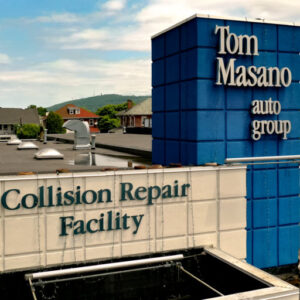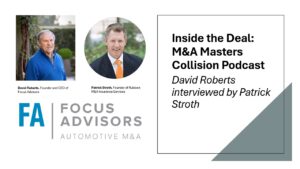This article was originally published by Elizabeth Crumbly on Autobody News and is republished here with permission.
Sellers are frequently reinvesting part of the proceeds into the business to ensure continued growth under the new owner.
As the collision world consolidates and owners of multi shop operations (MSOs) sell their businesses, a trend is emerging: investors purchasing smaller shop chains. That’s because private equity firms have a tough time making larger deals, explained Chris Lane, president of California-based Focus Advisors.
Sales of larger chains the size of Classic Collision or Crash Champions don’t happen that often because organizations that size are few and far between, he said, and the buying of smaller chains trends usually originates with independent sellers.
“There are only maybe eight, nine, 10 of those that can possibly happen, and they happen every four, five, six years. So, there aren’t that many of those available. And they’re incredibly competitive,” he explained. “At least five years ago, we were approached by a number of private equity firms looking at that next size of platform — a little bit smaller — something independent and not owned by a consolidator.”
That number, he said, has risen sharply in the past 18 months.
New Platforms
Private equity firms, Lane explained, look for platforms to purchase — typically MSOs that span more than one market. These MSOs, he said, have proven they can develop across multiple units in different markets with success, making them attractive to investors. In the past, he said, he recommended investors look at platforms in the $50 million to $100 million range in terms of annual sales, but those platforms were rare, and the purchase process when one does come to market is “incredibly competitive.”
“They’re very expensive,” he said. “I think what happened over time is as more private equity firms became interested in getting in collision repair … I think they recognized that getting in at the size that they would ideally like to get in at — the odds of doing that are very small.”
Rapid Growth
Private equity firms are now considering smaller platforms with three or four locations, and after making a purchase, firms try to grow those platforms rapidly through acquisitions. They may add two or three new locations in the first six months, he observed, to get close to the platform size they’re more comfortable with.
On the flip side of those sales, shareholders of independent MSOs are often looking to exit — to sell businesses outright.
Another scenario is recapitalization. Shareholders, Lane explained, want to “adjust the capitalization table.” In this case, he said, shareholders who each hold a certain percentage of ownership sell some of their equity to become part of a reorganized ownership group with added partners.
A variation of the recapitalization scenario sees owners continuing to run a business after an equity firm buys it. Investors, Lane pointed out, naturally have far less knowledge of the collision repair industry than independent MSO owners. In this instance, he said, the former owners partner with their buyers in a continued vision for the business. The sale process in this case includes comprehensive talks about business history and performance and the future, which may include new shop acquisitions and opening of brownfields and greenfields.
Focus Advisors helps with these sales frequently, and Lane said the best case isn’t always about finding the most money for sellers.
“The idea here isn’t just to get the highest dollar amount,” he said. “It’s to find the partner that you’re going to be operating alongside to grow this for the next five to seven years, so it had better be somebody you trust and that you like who shares your values. You get to choose who the best partnership is for you.”
Lane typically sees sellers putting some financial skin in the game, too.
“What they will do is they’ll come in and buy your business and then ask you to reinvest some of those proceeds back into this new entity that you’re both growing together,” he said. “Typically, an owner will have somewhere between 10% and 40% ownership in what they’re growing.”
The advantage to the owner, he explained, is that they’re selling a business for a decent valuation in the present, but they’re also helping to grow something over the next five to seven years, which they can sell again, eventually.
“We call that two bites of the apple,” he said.
A Growing Trend
As to why this trend is growing so quickly now, Lane said he sees the collision industry as relatively recession-resistant since third-party players — insurance companies — foot so many of the bills. Cars are becoming increasingly complicated to work on, too, he pointed out, which means they’re more expensive to fix. The price of parts continues to rise.
“Everything sort of has a built-in inflationary measure to it, which means that revenues are going to go up almost no matter what.” That dynamic, he contended, makes the market attractive to investors.
The trend of smaller chain sales, Lane said, is taking place across the country, but it’s important to investors to seek out healthy markets where they feel they can truly grow. Those markets, he said, are typically metropolitan and not already heavily consolidated, making for more choices for acquisitions. He’s seeing most private equity investors who are typically keeping in place existing leadership with added depth for new skill sets. That process might include adding a chief financial officer who can bring in sophistication with financial planning.
“If you’ve already grown your MSO to three, four, five locations and you’re doing a great job with it, they don’t want to monkey with that,” he said. “What they’re going to say is ‘Let’s look ahead and say that you’re going to be 10 locations. You don’t have the staff to do that. So let’s kind of bone up on that.’”
Careful Consideration
It’s especially important for MSO sellers, contended Madeleine Roberts Rich, senior associate with Focus Advisors, to do thorough due diligence on potential private equity partners.
“They are going to thoroughly vet and do due diligence on any owner they partner with,” she said. “Be reciprocal … You’re going to be putting years of your life and, potentially, your team members’ lives, and probably a very significant portion of your net worth on the line. Not all private equity firms are created equal or have the same personality types or have the same industry expertise.”
Private equity partnerships aren’t for every MSO owner looking to hand off their business, Rich said, but it’s for those hungry for something more.
“This is a perfect match for really hungry, ambitious entrepreneurs that want to take their collision repair business to the next level and that have teams they want to incorporate into that growth,” she said. “You’ve got to go in with a plan to get this kind of capital, but it can have massive rewards and eliminate bottlenecks to growth if you have a vision in mind.”
About Focus Advisors, Inc.
Focus Advisors (www.focusadvisors.com) is the collision industry’s leading M&A advisory firm, partnering with MSOs between $10-100M in annual revenue, helping owners achieve maximum value through strategic growth and exits. Unlike traditional business brokers or large investment banks, Focus Advisors specializes exclusively in collision repair — giving owners unparalleled insight into value, interest, and opportunity timing. With over 25 years in the industry, Managing Director David Roberts has led more than 40 transactions totaling over $500 million in transaction value and more than 325 collision repair shops, including Pride Auto Body, Quanz Auto Body, Mills Body Shops, and Master Collision Group.
Investment Banking Services and Securities offered through Independent Investment Bankers Corp, a broker-dealer, member FINRA, SIPC. Focus Advisors Automotive M&A is not affiliated with Independent Investment Bankers Corp.






